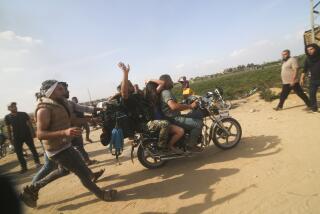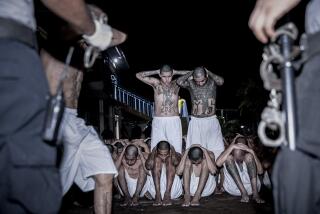Human Rights Group Assails ‘Setbacks’ by U.S. in Report
- Share via
WASHINGTON — The Clinton administration this year has “actively obstructed” human rights efforts as well as new mechanisms to enforce internationally accepted standards, according to a highly critical report released here Thursday by Human Rights Watch.
The report said U.S. actions have particularly been hurtful on three issues now on the front line of the push for global human rights: child soldiers, land mines and an international criminal court.
The administration practice of ignoring human rights in some areas and adopting a “selective” commitment based on economic convenience or strategic interests in others now poses “a growing threat” to human rights in key parts of the world, most vividly in China and Central Africa, according to “Human Rights Watch World Report 1998.”
“U.S. arrogance suggests that in Washington’s view, human rights standards should be embraced only if they codify what the U.S. government already does, not what the United States ought to achieve,” concluded the report, issued to mark Human Rights Day, which is next Wednesday.
The State Department on Thursday had no response to specific charges in the report, but spokesman James P. Rubin criticized its tone and conclusions, saying: “I think that if you look around the world and you ask the people of the world which nation they look to as to be the beacon for human rights, democracy and freedom, there’s no question the answer will be the United States.”
Because of the desultory U.S. performance, Human Rights Watch, an independent monitoring group based in New York, called on other countries to move ahead without the United States.
The U.S. is one of only two countries that haven’t ratified the international Convention on Rights of the Child, endorsed by 191 governments. U.S. conservatives bitterly oppose the convention, fearing that it will usurp parental authority and increase government control over child-rearing issues.
But as a result of this opposition, Washington also has not formally accepted the aspect of the convention that bans use of soldiers younger than 18.
On mines, which kill or maim about 25,000 people a year, the United States has tried to “weaken” an international treaty with “loopholes and exceptions,” Human Rights Watch contended, saying: “The Pentagon’s refusal to embrace the ban reflects its unwillingness to change its conduct even in light of evolving international humanitarian standards.”
In Ottawa on Wednesday, 125 nations signed the treaty that eliminates land mines in those countries and puts them in the same outlaw category as poison gas.
The United States insists that it cannot sign the mine ban unless it exempts the Korean peninsula. The U.S. and its allies contend that the devices are crucial to the defense of South Korea, some of whose most-populous areas could quickly be overrun in an invasion by the North.
On an international criminal court, the U.S. has fought for “restrictions” that would limit a new system designed to investigate and prosecute genocide, war crimes and other crimes against humanity, Human Rights Watch said.
A pivotal example is the U.S. demand that the United Nations Security Council approve any prosecution, which would introduce the possibility of a veto by any of the five permanent members. The U.S., which is one of those permanent members, argues that the council must have some say in which cases go to the court, especially if it already is dealing with a crisis in a particular country.
“The goal appears to be avoiding even the remotest possibility that an American might end up in the dock,” the report charged.
More to Read
Sign up for Essential California
The most important California stories and recommendations in your inbox every morning.
You may occasionally receive promotional content from the Los Angeles Times.










